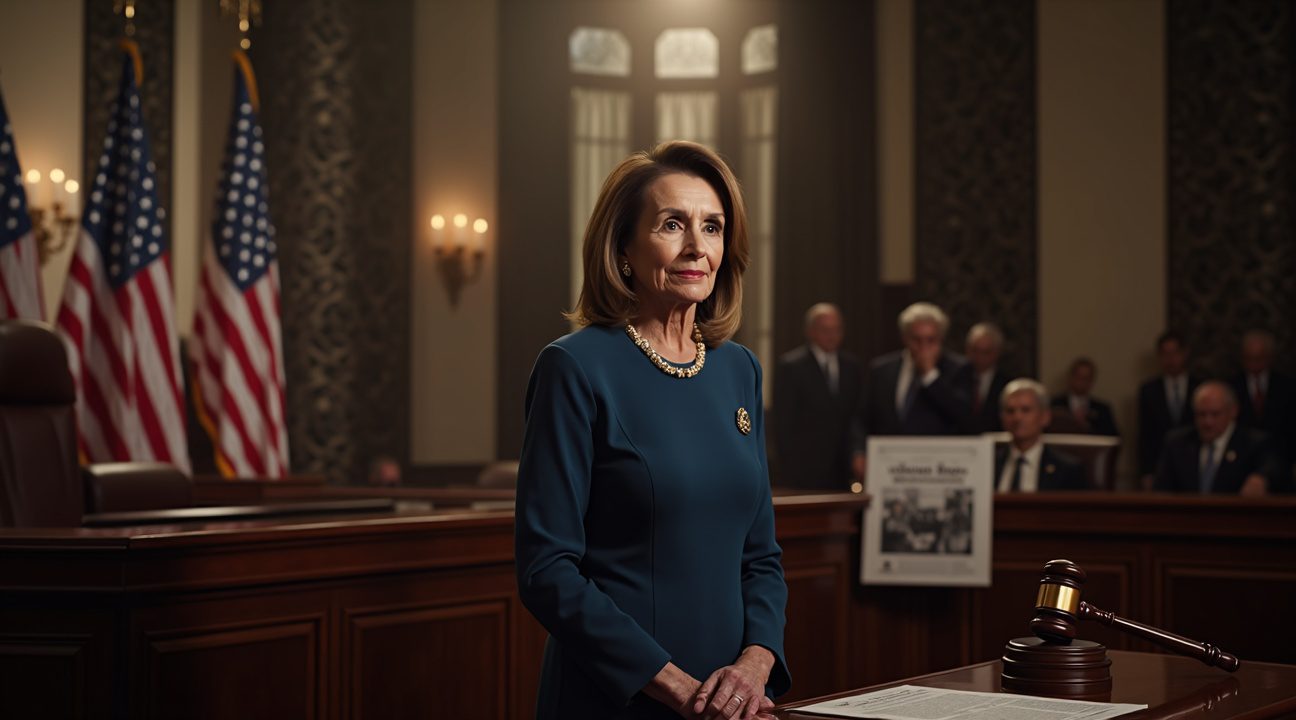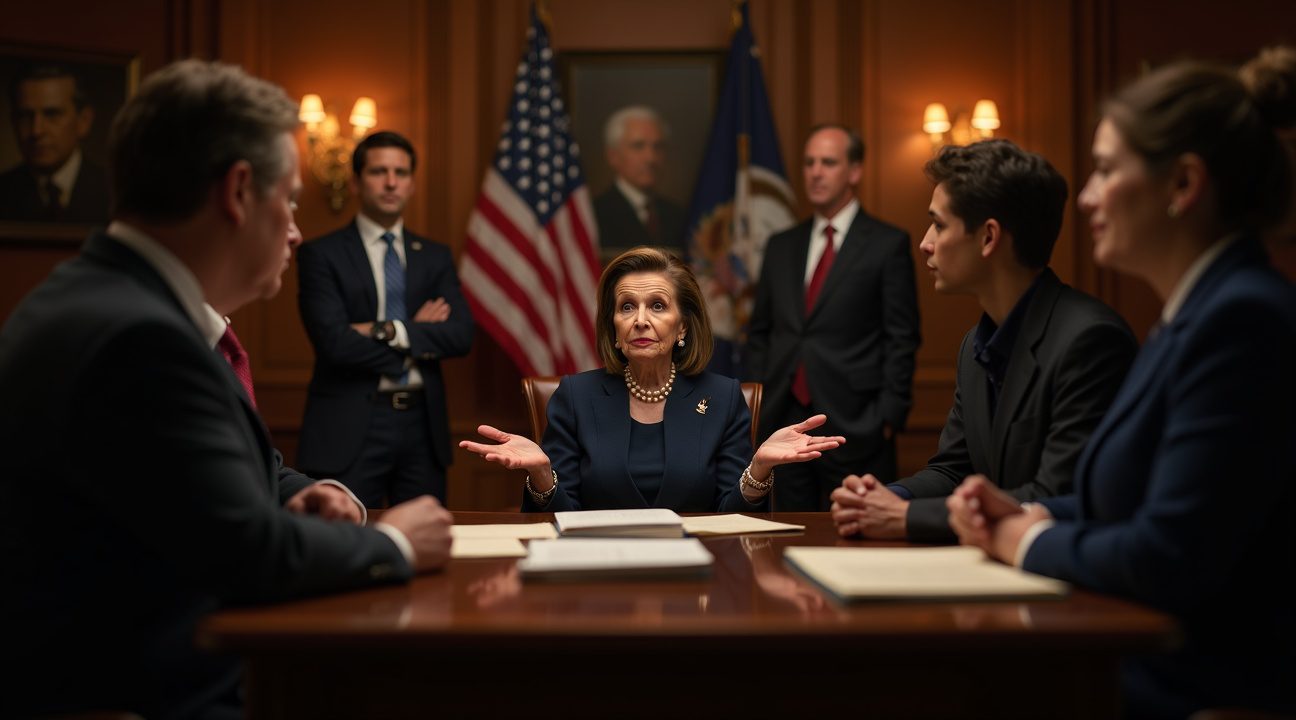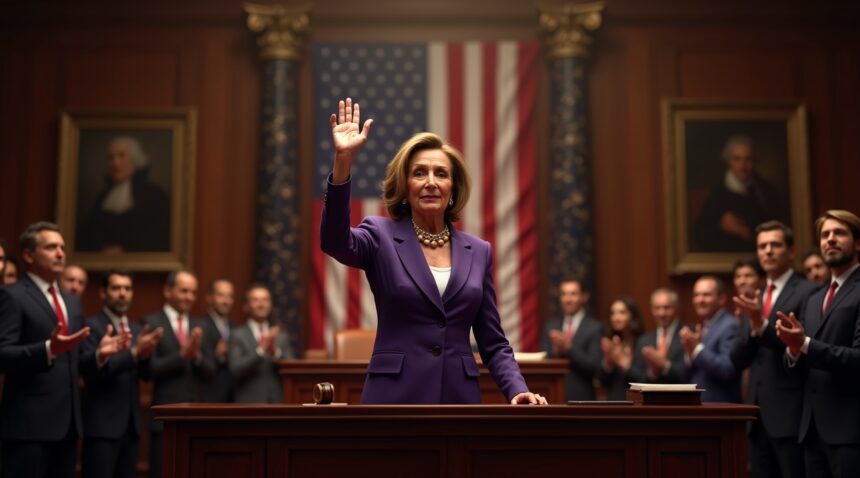Nancy Pelosi’s announcement of her retirement from Congress in November 2025 at age 85 marks the end of a transformative 40-year political career that reshaped American politics and broke multiple barriers for women in government.
Her departure closes a historic chapter that saw her become the first woman to serve as Speaker of the House, the most powerful woman in American political history, and a driving force behind landmark legislation including the Affordable Care Act.
Key Takeaways
- Historic Leadership: Pelosi became the first woman to serve as Speaker of the House in 2007, making her the highest-ranking woman in U.S. history at that time and second in line for presidential succession.
- Legislative Achievements: Her major accomplishments include shepherding the Affordable Care Act through Congress, leading economic recovery efforts after the 2008 financial crisis, and advancing climate change legislation.
- Barrier-Breaking Career: She systematically broke glass ceilings by becoming the first woman to serve as House Democratic Whip, House Democratic Leader, and ultimately Speaker, serving as the longest-serving Democratic party head in the chamber.
- Political Combat Style: Pelosi emerged as one of Trump’s most formidable congressional opponents, exemplified by her dramatic tearing of his State of the Union speech and her willingness to challenge powerful figures across party lines.
- Strategic Transition: After stepping down from party leadership in 2022, she spent her final years mentoring younger Democratic lawmakers and providing institutional knowledge before announcing her complete retirement from Congress.
Historic Speaker Steps Down After Four Decades of Service
Nancy Pelosi announced her retirement from Congress on November 6–7, 2025, at the age of 85, bringing to a close an extraordinary political career that spanned nearly four decades. I’ve watched her transformation from a freshman representative to one of the most influential political figures in American history.
Pelosi first took office in 1987, representing San Francisco in what would become a remarkable 40-year tenure in the House of Representatives. Her rise through the Democratic ranks demonstrated both strategic acumen and groundbreaking achievements that would reshape congressional leadership forever.
Breaking Barriers in Congressional Leadership
Pelosi’s career consistently broke new ground for women in American politics. She shattered several glass ceilings throughout her tenure:
- First woman to serve as House Democratic Whip in 2001
- First woman to hold the position of House Democratic Leader in 2002
- First woman to serve as Speaker of the House in 2007
- Longest-serving Democratic party head in the chamber with a 19-year leadership run
Her historic speakership began in 2007, where she served until 2011 before reclaiming the position again in 2019. This dual tenure as Speaker placed her among the most powerful political figures in the nation, second in the presidential line of succession.
The impact of her leadership extended far beyond symbolic victories. Under Pelosi’s guidance during the 111th Congress, Congressional scholar Norman Ornstein described the legislative session as “one of the most productive Congresses in history.” This period showcased her ability to marshal Democratic votes and navigate complex legislative challenges.
Throughout her career, Pelosi led House Democrats for more than 12 years across various leadership positions, establishing herself as a formidable political strategist. Her ability to maintain party unity while advancing progressive legislation earned respect from allies and opponents alike.
Her announcement marks the end of an era that began when political landscapes looked vastly different. During her tenure, she witnessed and influenced dramatic shifts in American politics, from the Clinton years through multiple presidential administrations.
Pelosi’s retirement comes at a time when political dynamics continue evolving rapidly. Her departure removes one of the most experienced voices in Congress, someone who understood both the institutional knowledge and tactical maneuvering required for effective governance.
The San Francisco representative’s legacy extends beyond her personal achievements to the doors she opened for future generations of women in politics. Her success in traditionally male-dominated leadership roles provided a template for aspiring female politicians across the country.
Her leadership style combined fierce partisan advocacy with pragmatic deal-making when necessary. This approach allowed her to advance Democratic priorities while maintaining the respect of institutional traditions that define congressional operations.
As she prepares to leave Congress, Pelosi’s impact on American politics remains undeniable. Her nearly four decades of service transformed not only her own party’s leadership structure but also expanded possibilities for women seeking positions of power in government.
The timing of her retirement announcement reflects careful consideration of both personal factors and political dynamics. At 85, she chose to step down while maintaining her influence rather than gradually diminishing her role.
Her departure will create significant changes in Democratic leadership structures and potentially alter the party’s strategic direction. The experience and institutional knowledge she accumulated over 40 years cannot be easily replaced.
Pelosi’s announcement represents more than just one politician’s retirement. It symbolizes the conclusion of a transformative period in congressional history, one defined by expanded opportunities for women and evolving approaches to legislative leadership.

Breaking Barriers as the Most Powerful Woman in American Politics
Nancy Pelosi’s ascent to the Speaker’s chair represents one of the most significant glass-ceiling shattering moments in American political history. When she claimed the gavel, she surpassed Madeleine Albright, the former Secretary of State, to become the highest-ranking woman in U.S. history at that time. This achievement wasn’t just symbolic – it fundamentally changed the power dynamics within Congress and set new precedents for women’s leadership in government.
A Series of Historic Firsts
Pelosi’s path to the speakership involved breaking multiple barriers along the way. Her political trajectory included several groundbreaking achievements:
- First woman to serve as House Minority Whip, establishing her as a formidable force in party leadership
- First woman to hold the position of House Minority Leader, demonstrating her ability to unite and guide her caucus
- First woman elected as Speaker of the House, placing her second in line for presidential succession
- Longest-serving woman in congressional leadership, maintaining her influence across multiple decades
Her consistent advocacy for women’s rights throughout her career earned recognition from numerous organizations. The National Women’s Hall of Fame inducted her in 2013, acknowledging her transformative impact on American politics and her role in advancing opportunities for women across the nation.
Beyond women’s issues, Pelosi built a reputation as a fierce advocate for LGBTQ rights. The Human Rights Campaign praised her as “the definition of an ally”, recognizing her unwavering support for equality legislation and her willingness to use her political capital to advance civil rights causes. Her leadership on these issues helped push critical legislation through Congress, including hate crime protections and anti-discrimination measures.
The Christian Science Monitor captured her influence perfectly when they described her as “the most powerful woman in American politics.” This designation reflects not just her formal title but her ability to shape national policy, control the legislative agenda, and influence political discourse across party lines. Her mastery of parliamentary procedure, combined with her strategic thinking and fundraising prowess, made her an indispensable figure within the Democratic Party.
Pelosi’s leadership style proved particularly effective during challenging periods. She demonstrated remarkable skill in maintaining party unity while managing diverse viewpoints within her caucus. Her ability to count votes, negotiate with opposing parties, and work with presidents from both parties showcased the pragmatic approach that defined her tenure.
Her influence extended far beyond the halls of Congress. Pelosi became a lightning rod for political criticism from conservatives while simultaneously inspiring countless women to pursue careers in public service. Her presence in leadership positions normalized the idea of women wielding significant political power, creating pathways for future generations of female politicians.
The financial sector took notice of her political acumen as well. Much like how major business leaders reshape industries, Pelosi transformed how Congress operates. Her fundraising capabilities revolutionized campaign finance strategies for House Democrats, while her media savvy helped her party communicate more effectively with voters.
Throughout various political upheavals, including major economic disruptions, Pelosi maintained her focus on advancing progressive policies. Her ability to pass complex legislation, from healthcare reform to climate change initiatives, demonstrated the effectiveness of her leadership approach.
Her retirement announcement marks the end of an era that fundamentally changed American politics. Future historians will likely view her tenure as a pivotal moment when women’s political leadership moved from exception to expectation. The barriers she broke won’t simply benefit women – they’ve expanded the talent pool for American political leadership and enriched the diversity of perspectives in government decision-making.
Landmark Legislative Legacy Spanning Healthcare to Climate Action
I recognize Nancy Pelosi’s legislative accomplishments as a defining feature of her congressional career, with her influence extending across critical areas of American policy. Her ability to shepherd complex legislation through Congress demonstrates the strategic political acumen that made her one of the most effective Speakers in modern history.
Healthcare Reform and Economic Recovery
The Affordable Care Act stands as Pelosi’s signature achievement, which she consistently described as her major accomplishment. I note how this groundbreaking legislation established a Patients’ Bill of Rights while expanding insurance coverage to tens of millions of previously uninsured Americans. The ACA’s long-term impact proved substantial, lowering healthcare costs while reducing the federal deficit by more than $100 billion over 10 years.
Following the 2008 financial crisis, Pelosi demonstrated her capacity to address multiple crises simultaneously. She led the passage of comprehensive Wall Street reforms that restructured financial oversight and regulation. Concurrently, her support for the American Recovery and Reinvestment Act in 2009 delivered tangible economic relief, creating and saving millions of jobs while providing tax cuts to 95% of working Americans. This legislation included the largest college aid expansion since the GI Bill, demonstrating her commitment to educational opportunity.
Social Progress and Environmental Leadership
Pelosi’s advocacy for social justice produced several landmark victories during her tenure. Her leadership helped repeal the “Don’t Ask, Don’t Tell” policy in 2010, finally allowing LGBTQ individuals to serve openly in the military. I observe how she championed worker rights by securing an increase in the federal minimum wage for the first time in a decade. Her support for the Lilly Ledbetter Fair Pay Act addressed gender-based wage discrimination, advancing workplace equality.
Environmental policy remained another cornerstone of her legislative agenda. Pelosi led efforts to pass the American Clean Energy and Security Act, comprehensive energy legislation designed to combat climate change through innovative approaches to renewable energy and carbon reduction. This legislation reflected her forward-thinking approach to environmental challenges and economic transformation.
These accomplishments demonstrate how Pelosi consistently built coalitions across diverse political interests. Her ability to navigate complex legislative processes while maintaining focus on progressive priorities established her reputation as a master legislator. Similar to how political leaders adapt their strategies over time, Pelosi evolved her approach while maintaining core principles throughout her career.
Trump Antagonist Who Shaped Modern Political Combat
I watched Nancy Pelosi transform into one of the most formidable opposition leaders in recent American history during her tenure as Speaker of the House. Her confrontational approach to political adversaries, particularly during the Trump administration, redefined how legislative leaders engage in partisan warfare.
The defining moment of Pelosi’s combative style occurred during Trump’s 2020 State of the Union address, when she dramatically tore up his speech behind him on national television. This unprecedented act of defiance symbolized her refusal to maintain traditional diplomatic courtesies with a president she viewed as fundamentally dangerous to democratic institutions. The gesture resonated far beyond the House chamber, cementing her reputation as Trump’s most effective congressional opponent.
A Pattern of Strategic Opposition
Pelosi’s willingness to challenge powerful figures extends well beyond her battles with Trump. Her political courage manifested early when she opposed the Iraq War resolution under President George W. Bush, despite the personal cost of breaking with her mentor who had helped author the legislation. She called Bush’s Iraq policy “a grotesque mistake,” demonstrating her readiness to prioritize principle over political convenience.
Her recent comments about Trump reveal the depth of her animosity, describing him as “a vile creature” and “the worst thing on the face of the earth.” Such stark language reflects her belief that extraordinary times require extraordinary responses from political leaders.
Behind the scenes, Pelosi wielded significant influence in shaping the 2024 presidential race. Reports suggest she used her considerable political clout to pressure President Biden to exit the contest, demonstrating her continued power even as she prepared for her own departure from congressional leadership.
This aggressive approach to political combat distinguished Pelosi from previous House speakers who typically maintained more diplomatic public personas. Her strategy proved effective in mobilizing Democratic opposition and maintaining party unity during challenging periods. The success of her confrontational style influenced how other Democratic leaders engage with Republican opponents, creating a more combative political environment that continues to shape congressional dynamics.
Pelosi’s legacy as a political fighter reflects her understanding that modern American politics requires leaders willing to abandon traditional norms when defending core democratic values. Her retirement marks the end of an era defined by her unique blend of strategic thinking and public defiance.

Dealing With Controversies From Stock Trades to Security Threats
Financial Scrutiny and Trading Allegations
Throughout her lengthy congressional career, Pelosi faced persistent scrutiny regarding stock trades conducted by both herself and her husband Paul. Critics frequently raised concerns about potential conflicts of interest, with some alleging insider trading based on her access to privileged congressional information. These accusations gained particular traction as high-profile stock transactions became more closely monitored by the public and media.
Pelosi consistently dismissed these allegations, maintaining that all trades complied with existing disclosure requirements and ethical guidelines. Her defenders pointed out that congressional members must report stock transactions within specific timeframes, and no formal charges were ever filed against her. Despite the ongoing criticism, she continued to advocate for transparency while defending her family’s investment activities as legally permissible.
Security Concerns and Personal Threats
Her prominent position as Speaker made Pelosi a frequent target of political threats and violence. The intensity of these security concerns escalated significantly during periods of heightened political tension, particularly during contentious legislative battles and partisan disputes.
The most serious incident occurred when her husband Paul suffered a violent attack three years ago, highlighting the real-world consequences of political hostility. This attack underscored how political figures and their families face genuine physical dangers as a result of increasingly polarized political discourse. The incident sent shockwaves through the political establishment and raised important questions about security protocols for congressional leadership.
Interestingly, Pelosi had contemplated retirement before the 2016 presidential election, considering stepping back from her leadership role. However, Donald Trump’s unexpected victory changed her calculations entirely. She felt compelled to remain in Congress to serve as a check against policies she viewed as harmful to American interests and democratic institutions.
This decision to stay demonstrated her commitment to public service despite personal costs. The combination of financial scrutiny, security threats, and family safety concerns created a challenging environment for her continued service. Yet she persisted through multiple election cycles, using her experience and institutional knowledge to advocate for Democratic priorities and maintain party unity during turbulent times.
Her eventual retirement announcement reflects both her desire to step back from the intense pressures of leadership and her confidence that younger Democratic leaders can effectively continue the party’s legislative agenda.

Transition to Elder Stateswoman Role
Nancy Pelosi’s political evolution took a significant turn in 2022 when she formally stepped down from her party leadership position. This strategic move allowed her to maintain her congressional seat while shifting focus to guidance and mentorship within the Democratic Party. Her decision reflected a calculated transition from front-line leadership to a more advisory capacity.
Mentoring the Next Generation
Following her leadership departure, Pelosi dedicated considerable energy to mentoring younger Democratic lawmakers who were navigating their early congressional careers. She provided invaluable insights on legislative strategy, coalition building, and effective communication with constituents. Her decades of experience proved instrumental in helping emerging leaders understand the intricacies of congressional procedures and political negotiations.
During this period, Pelosi remained deeply engaged in shaping policy direction for the Democratic Party. She continued to influence key legislative initiatives while allowing newer voices to take prominent roles in public debates. Her behind-the-scenes work included strategic planning sessions and policy development meetings where her institutional knowledge proved indispensable.
Final Congressional Chapter
Initially, Pelosi planned to continue representing her California district indefinitely, maintaining her connection to constituents who had elected her repeatedly since 1987. She viewed her role as providing stability and experience during turbulent political times. Her presence offered reassurance to voters who valued her proven track record of legislative achievements.
However, her November 2025 announcement marked a complete departure from public office, signaling her full retirement from Congress. This decision represents the end of an era for both California politics and national Democratic leadership. The announcement reflects her recognition that the time had come to pass the torch to the next generation of leaders she had spent years preparing.
Pelosi’s transition strategy demonstrates her understanding of political succession planning. Rather than clinging to power, she orchestrated a gradual handover that allowed for institutional continuity. Her approach mirrors successful leadership transitions seen in other major political shifts, such as those discussed in analyses of presidential succession planning.
The timing of her retirement announcement allows ample preparation for her replacement while ensuring her district maintains strong representation. Her legacy includes not just her own legislative accomplishments but also the development of future Democratic leaders who will carry forward her political principles and strategic insights.

Sources:
NBC News – Nancy Pelosi announces retirement from Congress (November 7, 2025)
National Women’s Hall of Fame – Nancy Pelosi (Inductee Profile)
Politico – Pelosi had 2 announcement videos ready. Only 1 saw daylight (November 6, 2025)
ABC News – Looking back at Nancy Pelosi’s accomplishments and controversies during her House leadership
Morgan State University Commencement – Nancy Pelosi Speaker Profile
The 19th News – After nearly 40 years, Nancy Pelosi is retiring from Congress (November 2025)
Poynter Institute – Nancy Pelosi retires with a long record, and a long fact-checking trail to match


